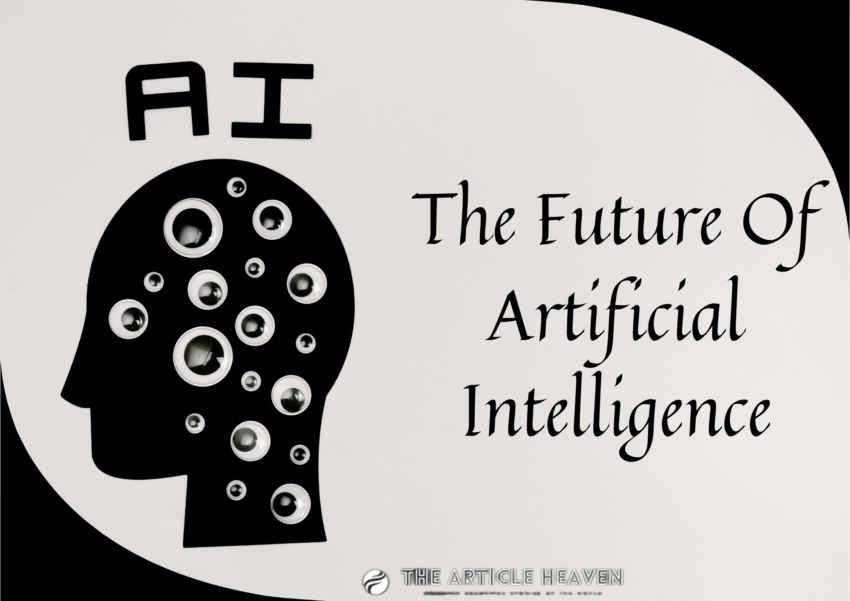The future of Artificial Intelligence (AI) is a widely discussed topic as it is shaping and forming industries, changing their flows, and rebranding human capabilities. The car going to drive itself on our roads and personal care going to be taken out for a patient are examples in such a list where AI is remodeling people’s interactions with other fellow human beings and other available technologies. The greater presence of AI, therefore, means the more entangling challenges that are presented are exciting. This article by The Article Heaven will discuss the future of AI in various industries, its ethical implications, technological advancement and societal shifts that it might bring along over the next few decades.
What is Artificial Intelligence?
Artificial Intelligence (AI) is a subfield of computer science that focuses upon creating systems capable of carrying out tasks that are specifically typical for human intelligence, including learning, reasoning, problem-solving, perception, language understanding, and sometimes creativity. AI technologies develop methods to allow machines to interpret data, recognize patterns, and consequently make decisions or predictions based on obtained information.
Also Read: Artificial Intelligence (AI) Technology Pros and Cons
Future of Artificial Intelligence
АI in Eduсаtiоn
The level of education received by young people will determine the progress of a country. We can see now that there are many courses that are accessible on AI nowadays. However, AI will be changing traditional schooling in the near future. Manufacturing industries are no longer requiring skilled workers because robots and technology have mostly replaced them.
Educative system is capable of turning out to be very specific or to an individual’s personality, skills. It would grant opportunities to brighter pupils shine and offer a better prospect for weaker students to level their grounds. Proper education has the capacity to strengthen man and nation, and inappropriate education might have disastrous prospects.
AI in Finance
Increased efficiencies and accuracy with better personalization abound throughout many financial services-automation of trading, or automation of fraud detection-from automated trading and AI driven financial advice that are pushing a new capacity toward efficient smooth operations and improving consumer experience. Trading through algorithms makes it possible for fast accurate finding of trends while trying to execute the same order rather as even any human analyst is considered. Fraud detection: It continuously monitors the transactions to spot and flag suspicious activities that can protect the user and institution. This is a feature that gives a personalized banking experience; this includes virtual assistants and robo-advisors that can assist a user in managing his finances and making good investment choices. The financial sector is experiencing a huge shift towards growth and security through AI adoption, as the financial institutions begin to incorporate AI in the automation process to minimize risks and provide personalized services.
AI in Transportation
Self-driving cars are not future technologies; they are now here in the form of smart cars. Only 8% of cars and other vehicles had AI-based technologies inside them in 2015, but the 2025 figure is forecast to be at 109%. Now, connected cars are all the buzz in the auto-industry today. The smart cars boast predictive systems that help drivers to know, time and time again, potential failure of spare parts, instructions on route and driving, emergency and disaster preventive measures and much more. By 2020, connected automobiles that have embedded wireless connections and networks shall be the industry’s norm. The prototype development of driverless vehicles also slowly but surely is entering reality.
AI in Healthcare
AI in healthcare revolutionizes the sector through enhancing diagnostics, treatment, and patient management. Machine learning algorithms are developed to diagnose diseases based on medical images, predict outcomes, and create individualized treatment plans, which in most cases are more accurate than existing methods. The use of diagnostic tools by AI will be able to identify early-stage cancer and heart diseases, while wearables are used for the monitoring of vital signs, allowing a real-time notification to health care providers about anomalies.
Also Read: Use of AI in Healthcare: How AI is Revolutionizing Patient Care and Medical Practices
AI in Media
The inclusion of AI in media content development, dissemination, and utilization is transforming the processes for smoothness and customization. The algorithm used by the machine learning helps in knowing the audience’s preference thus allowing media firms to deliver their contents in a tailored manner appealing to targeted demographics. AI optimizes workflows when developing news articles, video summaries, or social media posts. Furthermore, AI improves content curation with recommendations on the customized view options that result in greater engagement and retention. In advertising, AI modifies targeting strategies to hit the right audiences more effectively. As AI continues to change, it opens up creative opportunities but raises essential questions about authenticity and the future of storytelling.
AI in Customer Service
AI in customer service is one of the ways business reach out to their customers through efficiency and improvement of user experience. AI-based chatbots and virtual assistants give prompt support by answering commonly recurring questions and resolving the commonly recurring issues 24/7 without human intervention. This cuts the waiting time and makes more complex queries to human agents.
Further, AI can analyze customer data and interactions to provide personalized recommendations so that the responses will be tailored to individual needs. Sentiment analysis tools can assess customer feedback in real time so that companies can gauge satisfaction and make necessary adjustments promptly.
